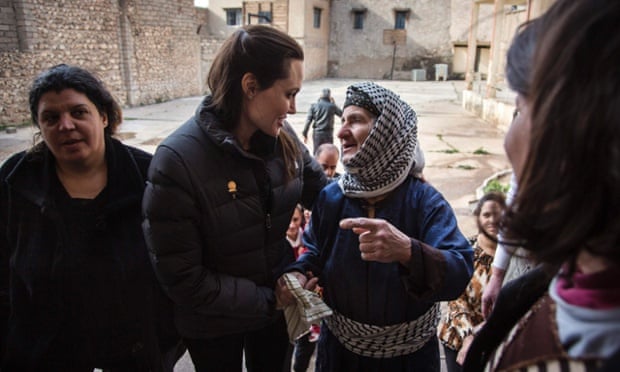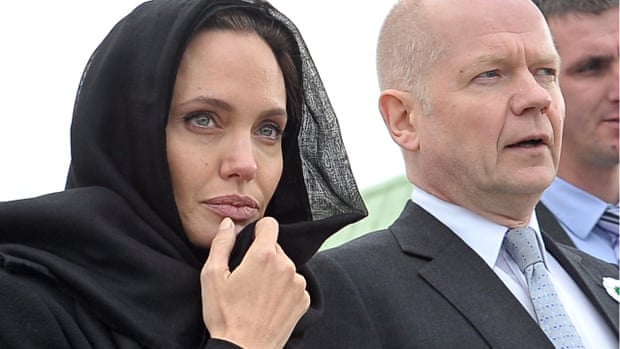Pomp and Hypocrisy UK-Style
"I have no idea [why it has taken so long to study the issue of sexual violence as a war crime]. I find it abhorrent and it makes absolutely no sense to me that we know that girls are being sold into sexual slavery; that when a woman is raped she is forced from her community; that girls as young as nine are being married off."
"I cannot fathom why it has ever been all right to treat women this way."
Angelina Jolie, anti sexual violence crusader, special envoy UN High Commissioner for Refugees

"Crimes against women have been accorded a lesser priority throughout history. Sexual violence in conflict involves the deliberate targeting of women and children and men, in ways that often simply defy the power of description."
"[The world has entered a period] of systemic instability [where sexual violence is seen as an inevitable part of war]. Despite this, we always have to strive to do something else as the United Kingdom, and that is to try to improve the condition of humanity … We can overcome that feeling that it’s a hopeless matter, that you can never change it."
William Hague, former UK foreign secretary
"This summit demonstrates there is a dangerous lack of joined-up thinking when it comes to tackling sexual violence against women. These are the same women. On one hand, you've got real progress being made in conflict zones overseas, but when those same victims make it to UK shores it's a completely different story. Women often aren't believed, and instead of being protected they're further traumatised by the asylum system. It's critical that the government tackles this issue with the same gusto at home as it's doing abroad and protects the survivors of sexual violence."
"Of course, it means often a woman won't disclose until far later and that is then used against her – 'why didn't she disclose at the beginning? She must be lying'. The lack of resources and gulf between policy and practice means there is some rank hypocrisy at work in the way we treat the very small number of women who actually make it to the UK."
Anna Musgrave, women's advocacy manager, Refugee Council
"It was very, very difficult. When you are a refugee, you think you might be treated kindly in the UK but ... they behave in the same way. Before I even told my story I was shouted at, screamed at: 'Why do you come here? Why did you sleep in a cardboard box on the street?'"
"You don't feel safe ever. The only basic humanity I have seen is from charities. The Home Office think I am a liar and they can come for me in the night, any time. I know what the officials are capable of. They say they want to save women from atrocities. I am that woman."
Refugee from Democratic Republic of Congo

The London School of Economics has created and opened its Centre for Women, Peace and Security, and the grand opening featured two celebrities; one an actor and international women's activist, the other a former member of the UK Cabinet. This does represent the first and for the time being, only think-tank that has dedicated a specific area of research to women as sexual victims of violence and rape during conflicts. Presumably, the studies will reach back into ancient history, to the present when women then and now were seen as war booty.
Angelina Jolie produced several videos of her interviews with Iraqi women living in refugee camps. They have been posted online and make for some very painful viewing in personal testimony by women who were forced to undergo spirit-draining, humiliating violence inflicted upon them by men. From biblical accounts of women taken as slaves and concubines after tribal wars, to the Korean comfort women, to the plight of German women when Russian troops took their revenge post WWII, to the mass rapes in Darfur and Congo and now Syria and Libya, these vicious violations speak of the ongoing depredations inflicted upon women.
On the other hand, these are women who suffer these dreadful events during and after conflict situations. But then, rape is part of the subjugation of women who are tormented when they refuse to adhere to the religious-cultural restraints placed on their individuality and basic human rights, in many countries of the world. Where in Muslim countries accusations of rape hold the victim to be equally accountable and even more so, for her plight. Where in India the male dominated culture victimizes women and girls in viewing rape as a male entitlement. The shame is the woman's; males only doing what comes naturally to them.
"Sometimes women are killed after they're raped, so we don't find [out] about them. Then you have the chaos of war, and you have people moving around, and on top of that you have the stigma that prevents women from coming forward" stated Lauren Wolfe, director of the Women Under Siege project at the Women's Media Centre in New York who has been tracking sexualized violence in Syria for three years, interviewing women in Jordanian refugee camps. "It comes down to a lack of money -- you have to have the aid workers and support systems in place", she noted.
"Advocates and survivors in regions across Ukraine repeatedly recounted how police often blame women for provoking the violence perpetrated against them", pointed out Atonina Vikhrest of Women Under Siege. Universally, it is clear enough, from Syria to Burma, Sudan to Somalia, armies and non-state militias use rape as a method of subduing civilians through fear and intimidation, terrorizing women and the men who care about them.
A case in point was the revelation by Human Rights Watch reporting on yet another mass attack by Sudanese army troops in North Darfur where area men were rounded up and held in segregation while hundreds of women and girls were raped in a 36-hour period. Over 150 countries signed the Declaration of Commitment to End Sexual Violence in Conflict, at the United Nations last year. A variety of United Nations resolutions have been passed highlighting war-zone sexual violence and the travesty of horror it represents targeting women who are usually non-combatants but easy prey.
The outcome of which is precisely nothing whatever.
Labels: Conflict, Sexual Predation, Sudan, Syria, Ukraine, Violence

0 Comments:
Post a Comment
<< Home